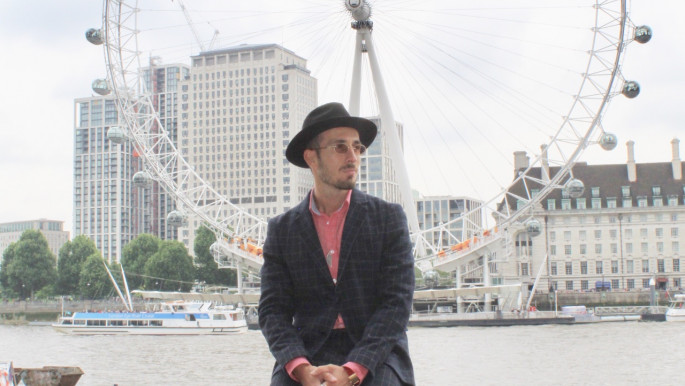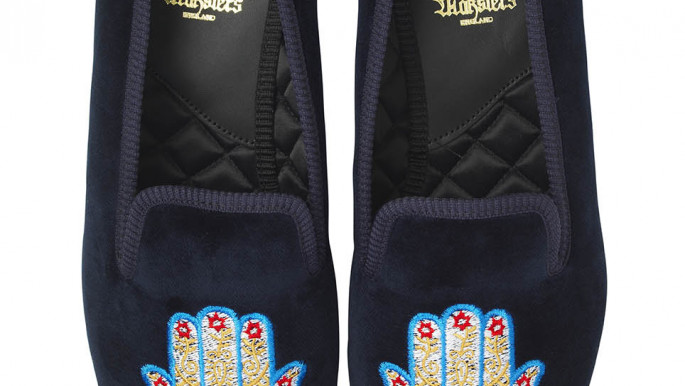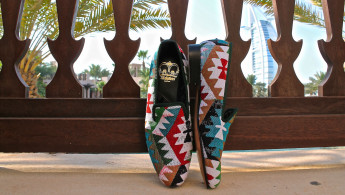Maksters: Weaving Palestinian roots into a cult shoe brand
It was towards the end of 2013, and he was strolling through London's famous Mayfair district one day. It happened to be just like any other day – until he tripped and fell.
"I got up and I happened to be in front of a shoe store – I can't remember what it was but there were some random shoes," Khaled recalled.
"I just happened to look in the store window and said to myself, 'they're really ugly, I could make better'.
"Still to this day, I don't know why or how I would say that. But a flood of ideas and designs came to me, so I quickly rushed home and I drew everything on paper. I spent the whole day and night just jotting down everything that was coming to my mind.
 |
|
| UAE-born, Gaza-raised Khaled Makki began working on Maksters in 2013 [Khaled Makki] |
"It was a very surreal experience. Then and there I just thought, 'yeah, this is what I'm going to do'."
The sudden well of inspiration didn't end there. Driven by determination, Khaled – with the help of his brother and co-founder Ahmed – went on to release the debut collection of Maksters in time for the 2014 Spring/Summer season.
Five years later, the label is still going strong.
Khaled has designed and released several more Maksters collections – which have become known for their modern adaptation of the Prince Albert slipper with outlandish, colourful and hand-embroidered designs.
Maksters has also been showcased in fashion shows and sold to customers globally via its online store or boutique retail stockists in the Middle East and London.
The brand has branched out to swim shorts, and even Egyptian superstar singer Amr Diab has been spotted wearing a pair of Maksters.
Not bad for a designer who had no hands-on background in fashion beforehand, and for a label whose minimal marketing budget has allowed it to make the most of its 40,000 Instagram followers.
"I've dabbled in fashion before but never really had to do extensive work in design," Khaled told The New Arab.
"So until I founded Maksters, I hadn't really designed anything – especially shoes."
He added: "Most of our budget goes into production because we are hand made and we're made in the UK.
"Instagram is our only marketing tool really, but it has been fantastic because the growth has been very organic and very natural."
 |
It's very important pay homage to my culture, but it's about how you do it |  |
| Instagram Post |
Born in the UAE to Palestinian parents but raised in Gaza, Khaled went on to study international relations and business in London before moving to Egypt in 2007 after he graduated from university.
There, he built up a career in magazines and publishing, which is also where he got his first taste of fashion through creative directing. He lived in Cairo up until 2011, after which he moved back to London.
"I was sort of freelancing, consulting here and there. But there was a period where I just didn't know what else I was going to do at that time," Khaled recounted.
"It was very hard... I had been wanting to start a project of mine but I just couldn't tell what it was. And then Maksters happened."
But why shoes – let alone Prince Albert slippers?
"We looked around at different sort of models and different shoes that were available and knew from the onset that this was the shape that we wanted to go for," Khaled explained.
"[My brother and I] always liked wearing shoes that we didn't have to tie. Even with my trainer, I usually tie it in a way where I'll slip in and out of it without having to redo it. So I like that aspect."
Khaled went on to admit that the colourful designs were done on purpose – not only to stand out in what is a saturated market, but also to meet customer demand.
"We wanted to do something that was crazy," he said.
"We became sort of known for that. It's funny because whenever we try and do something that's a little more reserved, more plain – our customers don't usually go for it."
 |
Whenever we try and do something that's a little more reserved, more plain – our customers don't usually go for it |  |
 |
|
| Maksters' popular Hamsa Hand design has 'become a classic' [Khaled Makki] |
He added: "It's important to try and have an identity… I tried over the last four or five years to create a language and have a synergy in the design, but also each one being completely out there."
Khaled has also not been shy in bringing his Arab culture into some of Makster's designs, especially when it comes to paying homage to his Palestinian roots.
For instance, one of label's first collection of slippers featured a recognisable design of an eye in the middle of a blue hand – otherwise known as the Hamsa Hand.
"We've re-released it because it's so popular and people love it. It's become a classic now," Khaled said.
"It's one of my favourites, and everybody seems to relate to it. In so many different cultures, not just Arab cultures – they all know that Hamsa Hand."
Another collection that has become a bestseller for Maksters is the Mykonos range, which features a patchwork design inspired by the pan-Arab colours of green, red, white and black.
Meanwhile, the Turath collection utilises tatreez, a traditional form of embroidery and patterns that's specific to Palestinian culture.
It's also hand-embroidered by Palestinian women themselves, as part of an initiative with the United Women of Palestine, an Egyptian-based charity.
Khaled said Turath's profits go to the women not only as a source of income, but also to keep their tradition alive. He also said Maksters was currently working on another collection with them.
"It's very important pay homage to my culture, but it's about how you do it," Khaled said.
"You don't want to be so cliché, you want to try and do something that pays homage but also at the same time be universal."
He added: "It's about trying to create something that's cool to wear, but also that has a message."
Follow Maksters on Instagram via @makstersofficial or visit www.maksters.com
Elias Jahshan is an editor and freelance writer based in London. He is a contributor to Arab, Australian, Other: Stories on Race & Identity, out now through Picador.
Follow him on Twitter: @Elias_Jahshan


![President Pezeshkian has denounced Israel's attacks on Lebanon [Getty]](/sites/default/files/styles/image_684x385/public/2173482924.jpeg?h=a5f2f23a&itok=q3evVtko)





